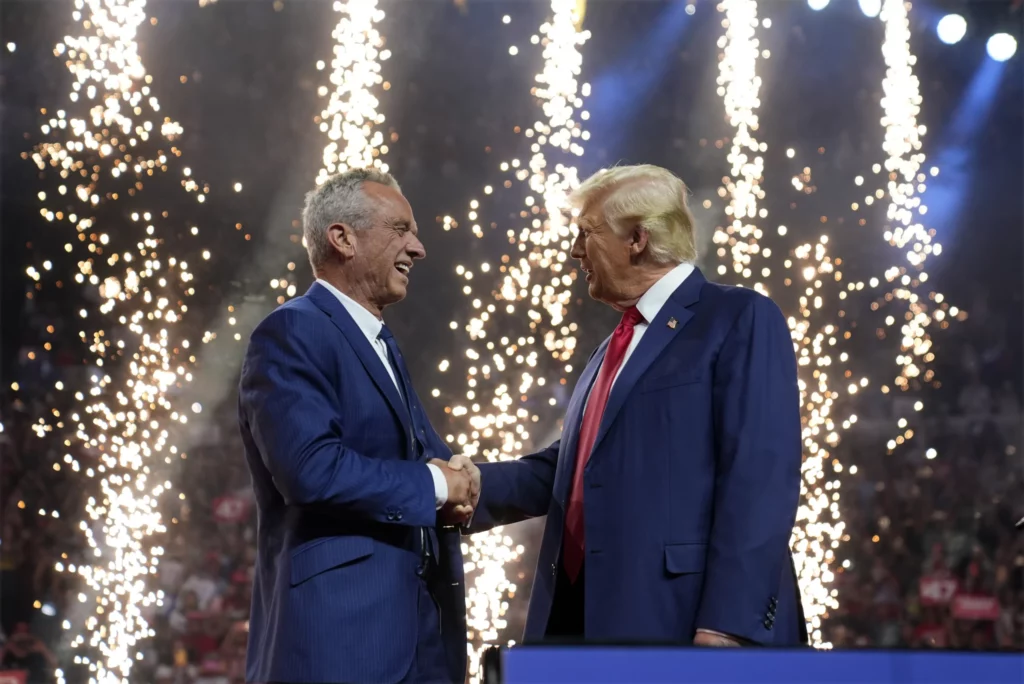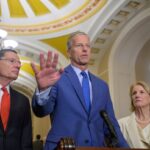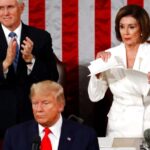
Robert F. Kennedy Jr. blew a chance to be the most successful third-party presidential candidate since Ross Perot but could still be consequential if he swings the battleground states and therefore the election to his preferred candidate.
Kennedy suspended his presidential campaign on Friday and endorsed former President Donald Trump. As with everything involving Kennedy, he made it more complicated than that — he played up that he was “suspending,” not “ending” his long-shot independent bid and urged people to still vote for him in safe red and blue states.
But Kennedy is urging his supporters in the states that will likely decide the Electoral College majority to vote for Trump and is taking his name off the ballot in the battleground states where it is still possible to do so. His endorsement could help Trump consolidate anti-establishment voters turned off by both major parties.
Both the timing of Kennedy’s announcement, the day after Vice President Kamala Harris accepted her party’s nomination at the Democratic National Convention, and his messaging were meant to blunt the Democrats’ recent momentum.

“Three great causes drove me to enter this race in the first place, and these are the principal causes that persuaded me to leave the Democratic Party and run as an independent and now to throw my support to President Trump,” Kennedy said. “The causes were free speech, the war in Ukraine, and the war on our children.”
Kennedy, who hails from an iconic Democratic family and is the son of the former attorney general, senator, and 1968 presidential candidate assassinated by Sirhan Sirhan, was initially going to be President Joe Biden’s main primary challenger. As the longtime progressive activist gravitated toward conspiracy theories that generally have a greater following on the Right than the Left, he decided to strike out as an independent.
Democrats long viewed him as a stalking horse for Trump, first trying to drive up Biden’s negatives in the primaries and then trying to siphon away votes from their party by appearing on state ballots as independent with the Kennedy surname. Congressional Republicans elevated Kennedy by having him testify about social media censorship and supported misinformation upon taking the House.
But as Democrats made the switch from Biden to Harris, disaffected progressives started to come home and it began to appear Kennedy was taking more votes from Trump. Kennedy said Friday that was what his own campaign polls found.
Kennedy failed mightily to capitalize on the opportunity presented by being the biggest-name alternative to Biden and Trump, major-party choices voters repeatedly told pollsters they disliked. Biden’s reelection campaign collapsed after a June 27 debate with Trump, but this did nothing to arrest Kennedy’s own drop in the polls.
Based on past history with third-party candidates, Kennedy’s numbers were likely to continue to fade as the general election approached and voters decided they must choose between Trump and Harris. Once in the double digits, he was at 5% nationally in the RealClearPolitics average when he called it quits, more than Ralph Nader’s actual vote share in 2000 and Gary Johnson’s in 2012 or 2016 but significantly less than Perot’s in 1992 or 1996, John Anderson’s in 1980, or George Wallace’s in 1968.
That is still more than the difference between Harris and Trump nationally or in many battleground states. Nader and later Green Party nominee Jill Stein were able to swing states with less. Democrats blamed them for their losses in 2000 and 2016, respectively.
Moreover, there is a type of voter that has since 2016 floated between the Bernie Sanders Left and the MAGA Right that was drawn to Kennedy. Top podcaster Joe Rogan and his large audience are examples of this phenomenon. Conservative attitudes about the COVID-19 vaccine have hardened since the end of the pandemic despite Trump’s role in its development, and now there is no significant anti-vaccine candidate in the race.
CLICK HERE TO READ MORE FROM THE WASHINGTON EXAMINER
How many voters exist in this orbit is unclear, but disenchanted Sanders supporters and other anti-establishment types were important in the 2016 presidential election Trump won and could be again this year. While Harris has been on an upward trajectory since replacing Biden and could see a convention bounce, most polls nationally and in the battlegrounds still show a close race, often within the margin of error.
While Kennedy still teased a scenario in which a deadlocked Electoral College could revive his ambitions, tossing the election to Trump, which many Democrats always suspected he really wanted to do, would certainly have an impact no previous independent candidate has ever had.





